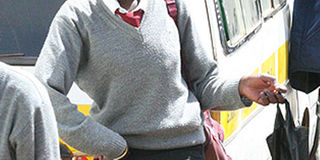We must make schools safe for children

During the nine-month school break due to the Covid-19 pandemic, many girls fell pregnant, although the actual figures remain elusive.
Kenyans breathed a sigh of relief this month as schools reopened on January 4, 2021.
The Covid-19 pandemic had drained Kenyans socially and economically. The education sector was worst hit with many children being exposed to all forms of abuse after the pandemic interrupted their learning. However, very little has been done about the dangers learners face while they are out of school.
We often begin talking about the plight of children when there are rising cases of child abuse. Education Cabinet Secretary George Magoha has issued orders aimed at tracking school girls who may either be pregnant or have given birth to ensure they take their place back at school.
This followed a stern warning by President Uhuru Kenyatta to chiefs over increased cases of teenage pregnancies.
Sadly, the abuse in our communities is well documented and several Non-Governmental Organisations and local authorities are working hand in hand to address the problem. As schools re-opened, the government has also focussed on Covid-19 safety protocols. However, we must not forget the importance of the safety of our children. We must create safe learning environments.
Between 2014 and 2019; an average of 125 teachers were dismissed a year by the Teachers Service Commission (TSC) for sex abuse related cases in learning institutions.
In 2009, the TSC reported that up to 12,660 girls were sexually abused by teachers over a five-year period. Despite that, only 633 teachers were disciplined while most of the cases went unreported. Records at the TSC were not clear on the number of schoolgirls abused but the report said that in some cases, teachers abused as many as 20 girls in a single school before they were reported.
In 2019, the TSC reported that it had sacked 1,228 primary and secondary school teachers in the previous seven years over sexual relationships with their learners. The commission admitted that many cases go unreported because some cultures and communities engender early marriages, while vulnerable parents are compromised by perpetrators. A study in 2014 on sex abuse of school children by teachers interviewed 500 students.
At least 57.6 per cent perceived sex abuse by teachers in Makueni County as ‘high’, while only 10.2 per cent perceived it as ‘low’.
This is supported by a study in 2009 where children were asked whether they knew of learners in sexual relationships with teachers. Twenty one percent of respondents claimed to know girls in such relationships.
It was reported that only 10 per cent of sexual abuse cases were reported to the TSC. Of all the cases reported, just 70 per cent of the teachers were either dismissed or retired. The rest (30 per cent of those reported) were transferred to new institutions.
Parents who believe their children are safe in the classroom may be putting their children at risk because of weak processes.
Studies show that there is a strong correlation between poverty and child abuse. The rates abuse are higher in communities where poverty is high such as informal settlements.
Our organisations working in safeguarding, health, education and social work have focussed on tackling environments which enable abuse to take place.
At Tunza, we work with organisations to improve child safeguarding policies and procedures. One of the case studies at Tunza, is that of Bridge Kenya with strong child safeguarding procedures that have been implemented in schools. Bridge Kenya works in the low income communities such as Mukuru and Sinai slums in Nairobi. It has taken a zero tolerance approach to child abuse.
Other organisations that are helping to create safer environments for our children are Mtotonews and Kenya Alliance for Advancement of Children Rights.
We must continue to push for high safety standards for children in all areas. We must support communities and parents. We must ask how we can protect our children. We must support organisations that are working round the clock to protect our youth.





